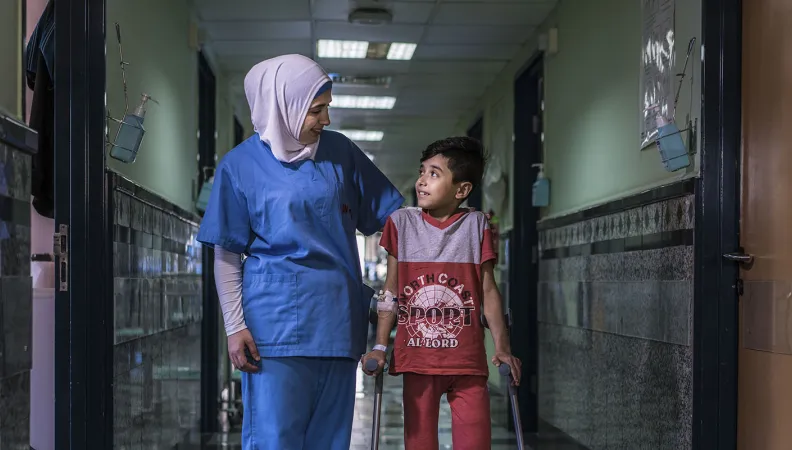Share the page
Reinforcing the provision of care at Tripoli Governmental Hospital (TGH)
Project


-
Project start date
-
Status
Ongoing
-
Project duration
-
4 years
-
AFD financing amount
-
€ 21 100 000
-
Country and region
-
Location
-
Tripoli
-
Type of financing
-
Partners
-
King Salman Humanitarian Aid & Relief Centre (KSRelief)
-
Beneficiaries
-
ICRC, TGH
Co-funded by AFD and the King Salman Humanitarian Aid & Relief Center, the project is implemented by the International Committee of the Red Cross (ICRC) and aims to strengthen the health care services provided by Tripoli Governmental Hospital (TGH) and ensure vulnerable populations in North Lebanon have impeded access to these services.
Context
Lebanon is currently undergoing a multifactorial, political and socio-economic crisis, exacerbated by the Covid-19 pandemic. Tripoli is particularly affected with the vast majority of households living below the poverty line, most of whom have been witnessing some kind of food insecurity. Population’s access to basic services has also deteriorated significantly, particularly access to health services.
The dramatic worsening in living conditions has increased the levels of violence in Tripoli, prompting repeated protests and clashes since October 2019. These tensions have led to a significant number of injuries, which have overwhelmed the city’s hospitals already under severe stress due to the socio-economic crisis. TGH admitted over 40% of the injured. In addition to the increased number of trauma and surgical emergencies, medical and obstetrical emergencies have also increased sharply due to reduced access to primary health services and preventive care for vulnerable populations in the region.
The large presence of Syrian refugees with compounded health care needs in the north of the country is exacerbating the strain on the health care system. The lack of resources overburdens existing health structures, thus restricting access to basic care for Lebanon’s most vulnerable residents. This competition for access to basic services is one of the main causes of tensions between Syrians and Lebanese.
As the second largest public hospital in the country, TGH is the main referral hospital for vulnerable populations who do not have access to the private healthcare sector. Its occupancy rate is always above 90%. Due to the crisis and serious budget constraints, TGH is losing employees and facing deterioration of its infrastructure and equipment.
Description
The project will be implemented as part of a partnership agreement between the ICRC and the TGH. The main objective of which is to enhance the quality of and equitable access to healthcare in a context marked by significant social inequalities, especially those related to gender.
To this end, the project will finance the upgrading of the hospital’s infrastructure, including interventions in the emergency department and the neonatal and pediatric intensive care units. It will also strengthen the availability of medical supplies, through the provision of equipment, consumables and medicines and staff capacity building.
Impacts
Ultimately, the project will benefit the whole population of the North Governorate: 638 000 Lebanese (including 244 000 residents of Tripoli), 233 000 Syrian refugees, and roughly 50 000 Palestinian refugees. Additionally, it would ensure the training of 200 healthcare providers (doctors and nurses) and other hospital staff.
Special attention will be given to gender vulnerabilities, particularly gender equality in patient admission, in management of the hospital staff as well as in relation to exchanges with authorities, and in networking with other health institutions.


